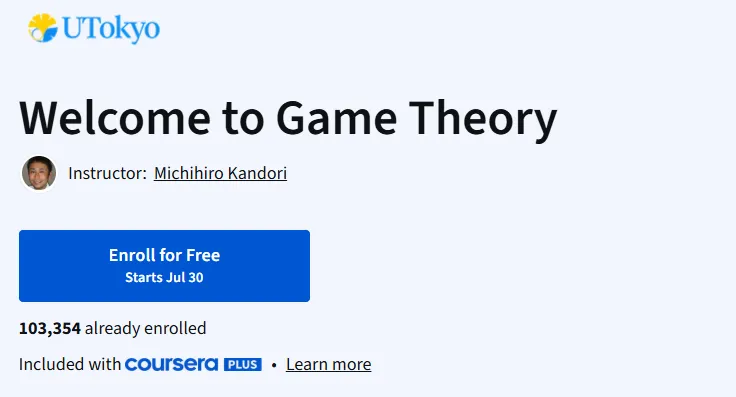What will you learn in Welcome to Game Theory Course
Fundamental concepts of game theory, including Nash equilibrium, dominant strategies, and backward induction.
Strategic decision-making in interactive environments involving competition and cooperation.
How to analyze real-world scenarios like auctions, voting systems, and business negotiations using mathematical models.
Methods to predict and influence outcomes in strategic situations.
Program Overview
Module 1: Introduction to Game Theory
⏱️ 1 week
Topics: Players, strategies, payoffs, rationality assumptions.
Hands-on: Simple game model construction and analysis.
Module 2: Dominant Strategies & Nash Equilibrium
⏱️ 1 week
Topics: Pure strategy Nash equilibria, dominance, strategic stability.
Hands-on: Calculate Nash equilibria in static games.
Module 3: Extensive Form & Backward Induction
⏱️ 1 week
Topics: Game trees, sequential games, subgame perfection.
Hands-on: Use backward induction to solve multi-stage games.
Module 4: Mixed Strategies
⏱️ 1 week
Topics: Probability in decision-making, mixed strategy Nash equilibria.
Hands-on: Analyze games without pure strategy solutions.
Module 5: Repeated Games & Reputation
⏱️ 1 week
Topics: Infinite horizon games, cooperation enforcement, tit-for-tat.
Hands-on: Model long-term interaction strategies.
Module 6: Applications of Game Theory
⏱️ 1 week
Topics: Auctions, voting, oligopoly pricing, evolutionary games.
Hands-on: Case study analysis and economic simulations.
Get certificate
Job Outlook
High relevance in fields such as economics, political science, business strategy, AI, and data science.
Game theory is a foundational tool for strategic roles in consulting, tech, policy analysis, and academia.
Valuable for professionals in operations research, fintech, law, and competitive market analysis.
Specification: Welcome to Game Theory
|
FAQs
- Basic understanding of probability and algebra recommended.
- No prior economics background required.
- Focuses on strategic thinking and decision-making frameworks.
- Suitable for students, professionals, and curious learners.
- Provides hands-on exercises to apply game theory in real-world scenarios.
- Covers Nash equilibrium, dominant strategies, and backward induction.
- Explains subgame perfection and mixed strategies.
- Teaches repeated games and reputation effects.
- Hands-on exercises in constructing and analyzing games.
- Prepares learners to predict and influence strategic outcomes.
- Analyze auctions, voting systems, and oligopoly pricing.
- Explore evolutionary games and strategic interactions.
- Hands-on simulations for economic and political scenarios.
- Case studies enhance understanding of real-world applications.
- Helps learners make strategic decisions in professional contexts.
- Prepares learners for consulting, policy analysis, and strategic roles.
- Valuable for careers in AI, fintech, operations research, and economics.
- Enhances analytical and problem-solving skills.
- Certificate demonstrates mastery of game theory fundamentals.
- Builds a foundation for advanced courses in decision sciences.
- 6 modules: Introduction, Dominant Strategies & Nash Equilibrium, Extensive Form & Backward Induction, Mixed Strategies, Repeated Games & Reputation, Applications.
- Each module: ~1 week at a moderate pace.
- Self-paced with lifetime access.
- Hands-on exercises and case studies in each module.
- Total duration: ~6 weeks.





